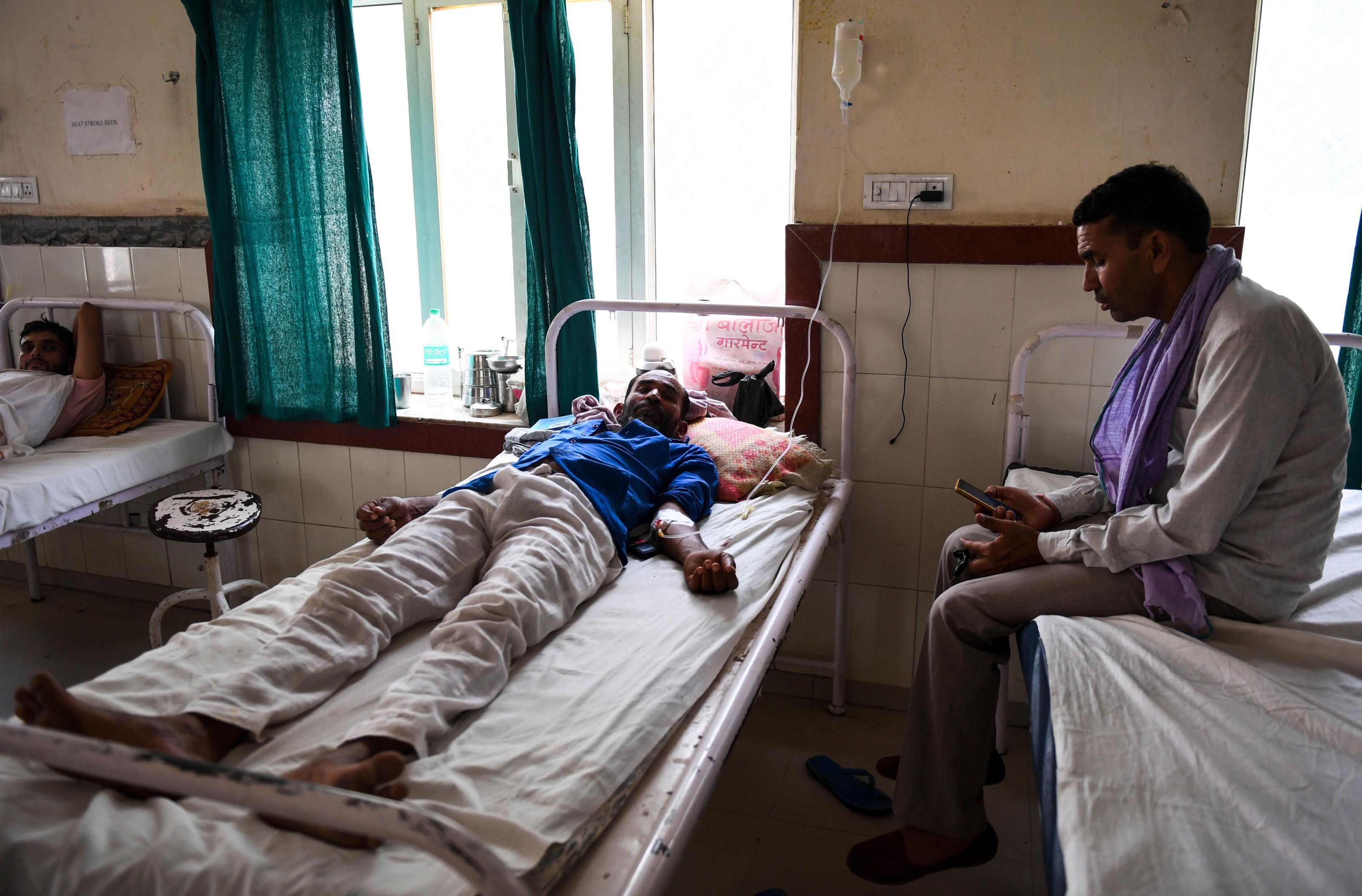Healthy Human Future Still Possible If World Ditches Fossil Fuels: Lancet Study
"Immediate action could still save the lives of millions, with a rapid shift to clean energy and energy efficiency," says the lead author of a new report.
While a continuation of the fossil fuel-dominated status quo threatens to "lock in a fatally warmer future," policymakers can still secure a "thriving future" for humanity if they pursue a "health-centered" response that confronts the oil and gas industry responsible for shortening and endangering millions of lives around the globe.
"The climate crisis is killing us."
That's according to a major report published Tuesday in the Lancet, a leading source of peer-reviewed research, which states that "the just transition to a healthy future can no longer be delayed."
Since 2016, the Lancet Countdown: Tracking Progress on Health and Climate Change, a collaborative effort to understand and alleviate the deadly impacts of the fossil fuel-driven climate emergency, has released an annual report in its namesake journal.
"This year's Lancet Countdown makes clear that fossil fuels are incompatible with a healthy future," said Dr. Jeni Miller, executive director of the Global Climate and Health Alliance.
"To prevent catastrophic global warming and the ensuing devastation that will be wreaked upon people around the world, governments must commit to fully phasing out fossil fuels at COP27," Miller added, referring to the United Nations climate summit set to take place in Sharm El Sheikh, Egypt from November 6-18.
The report, compiled by 99 experts from 51 institutions, including the World Health Organization and the World Meteorological Organization, examines the relationship between the climate crisis and public health across five domains and 43 indicators in 103 countries.
According to the Lancet Countdown:
A persistent fossil fuel addiction is amplifying the health impacts of climate change, and compounding the concurrent energy, cost-of-living, food, and Covid-19 crises we face. Governments and companies continue to prioritize fossil fuels above, and to the detriment, of peoples' health, jeopardizing a liveable future. The world faces a critical juncture. A health-centred, aligned response to the compounding crises can still deliver a future where people can not only survive, but thrive.
Researchers detail how unmitigated greenhouse gas pollution is throwing lives into chaos around the world. The increasing frequency and lethality of extreme weather disasters and the growing risk of infectious disease outbreaks on a rapidly warming planet, they note, show that public health has been put "at the mercy" of fossil fuel interests.
Key findings regarding the negative health impacts of the climate crisis include:
- Vulnerable populations—the elderly and children under 1 year of age—faced 3.7 billion more life-threatening heatwave days in 2021 than annually in 1986-2005 and heat-related deaths increased by 68% between 2000–04 and 2017–21;
- Human exposure to days of very high or extremely high fire danger increased in 61% of countries from 2001–2004 to 2018–2021;
- On average, 29% more global land area was affected by extreme drought for at least one month in a year in 2012–21 than in 1951–60;
- The climatic suitability for the transmission of dengue increased by 11.5% for Aedes aegypti and 12.0% for Aedes albopictus from 1951–60 to 2012–21; and
- The increasing frequency of heatwaves resulted in an additional 98 million people reporting moderate to medium food insecurity in the 103 countries analyzed in 2020, compared with the 1981-2010 average.
Despite these alarming statistics, "the carbon intensity of the global energy system decreased by less than 1% since 1992, the year the [U.N. Framework Convention on Climate Change] was adopted," the Lancet Countdown finds.
Meanwhile, energy-related carbon dioxide emissions hit a record high in 2021, and governments around the world continue to prop up the fossil fuel industry with hundreds of billions of dollars in public subsidies each year—sometimes exceeding "their total health budgets," the report points out. Moreover, high-income countries have failed to follow through on their already modest commitments to help finance a just transition.
"It doesn't have to be this way," the authors argue.
Shifting toward "sustainable energy, transportation, waste management, and agricultural systems could help prevent the 3.3 million deaths attributable to anthropogenic PM2.5 in 2020, including the 1.2 million directly related to the combustion of fossil fuels," says the Lancet Countdown. In addition to reducing premature mortality, a transition to renewable power sources would also improve energy access and grid reliability.
Moreover, the adoption of low-carbon, plant-rich diets could help prevent the 11.5 million deaths attributable to poor nutrition in 2019. In addition, "green urban redesign could increase climate resilience while improving physical and mental health through healthier, more liveable cities," the report notes.
"We see how climate change is driving severe health impacts all around the world, while the persistent global fossil fuel dependence compounds these health harms amidst multiple global crises, keeping households vulnerable to volatile fossil fuel markets, [and] exposed to energy poverty and dangerous levels of air pollution," Dr. Marina Romanello, executive director of the Lancet Countdown at the University College London, said in a statement.
"Despite the challenges, there is clear evidence that immediate action could still save the lives of millions, with a rapid shift to clean energy and energy efficiency," said Romanello. "Accelerated climate action would deliver cascading benefits, with more resilient health, food, and energy systems."
"With the world in turmoil," she added, "governments and companies have the opportunity to put health at the center of an aligned response to these concurrent crises, and deliver healthy, safe future for all."
The seventh annual Lancet Countdown report was published one day before the U.N. sounded the alarm about the world's dramatic failure to quickly implement transformative policies at the scale needed to avert the worst consequences of the climate emergency.
Even if the 193 national parties to the Paris agreement—which seeks to limit warming to a still-dangerous 1.5°C above preindustrial levels—meet their current emissions reduction targets, the U.N. warned, global greenhouse gas pollution would increase 10.6% over 2010 levels by 2030 and average surface temperatures would rise by a devastating 2.1 to 2.9°C by century's end.
Despite the glaring inadequacy of existing plans and investments, only about two dozen countries have strengthened their pledges since last year's COP26 meeting in Glasgow, Scotland.
"The climate crisis is killing us," U.N. Secretary-General António Guterres said in a statement.
"It is undermining not just the health of our planet, but the health of people everywhere—through toxic air pollution, diminishing food security, higher risks of infectious disease outbreaks, record extreme heat, drought, floods, and more," Guterres continued.
Another recent report warned that in the absence of swift decarbonization, extreme heat is projected to kill as many people by the end of the century as all cancers and infectious diseases combined, with disproportionate impacts on people in impoverished nations. By mid-century, more than two billion children are at risk of suffering from frequent heatwaves.
"Human health, livelihoods, household budgets, and national economies are being pummeled, as the fossil fuel addiction spirals out of control," said the U.N. chief. "The science is clear: massive, commonsense investments in renewable energy and climate resilience will secure a healthier, safer life for people in every country."
Looking ahead to COP27, Guterres added, "The world is watching and G20 countries—the source of 80% of global greenhouse gas pollution—must lead the way to a just, greener, and healthier future for all."




0 Comments:
Post a Comment
Subscribe to Post Comments [Atom]
<< Home